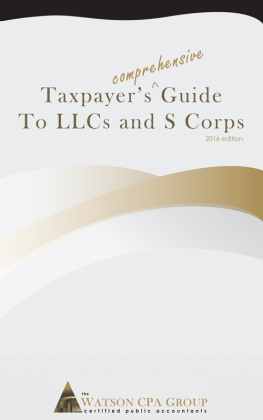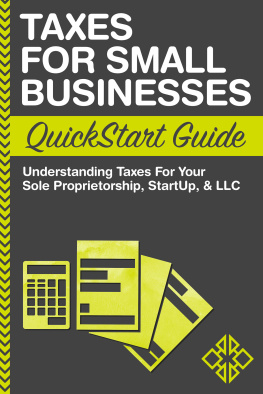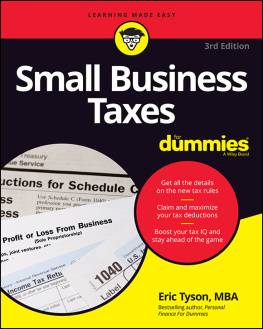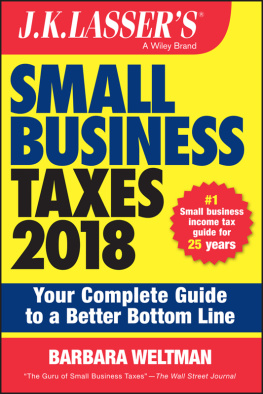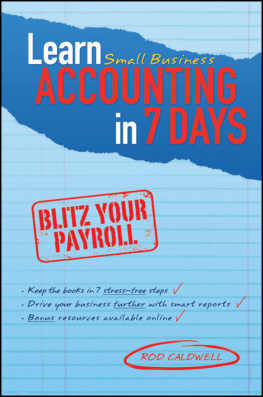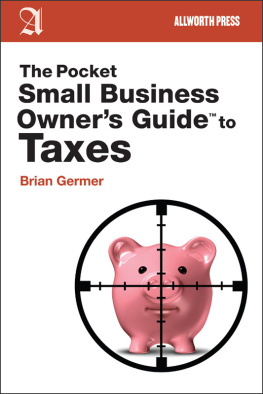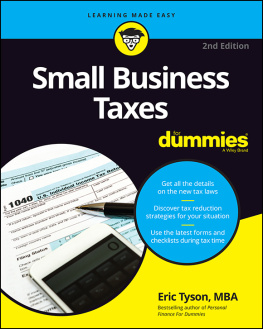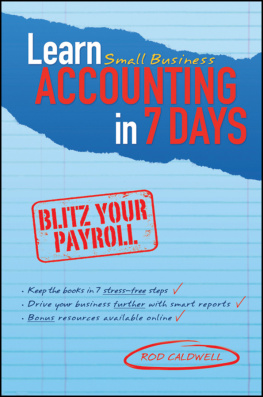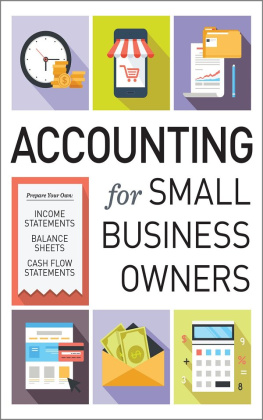Tax Accounting
A Guide for Small Business Owners Wanting to Understand Tax Deductions, and Taxes Related to Payroll, LLCs, Self-Employment, S Corps, and C Corporations
Copyright 2021
The contents of this book may not be reproduced, duplicated, or transmitted without direct written permission from the author.
Under no circumstances will any legal responsibility or blame be held against the publisher for any reparation, damages, or monetary loss due to the information herein, either directly or indirectly.
Legal Notice:
This book is copyright protected. This is only for personal use. You cannot amend, distribute, sell, use, quote, or paraphrase any part of the content within this book without the consent of the author.
Disclaimer Notice:
Please note the information within this document is for educational and entertainment purposes only. Every attempt has been made to provide accurate, up to date, and reliable complete information. No warranties of any kind are expressed or implied. Readers acknowledge that the author is not engaging in the rendering of legal, financial, medical, or professional advice. The content of this book has been derived from various sources. Please consult a licensed professional before attempting any techniques outlined in this book.
By reading this document, the reader agrees that under no circumstances is the author responsible for any losses, direct or indirect, which are incurred because of the use of the information within this document, including, but not limited to, errors, omissions, or inaccuracies.
Table of Contents
Introduction
"In this world, nothing is certain except death and taxes." Benjamin Franklin
Taxes are so important to where the great mafia gangster Al Capone was arrested not because of his many violent crimes but because of tax evasion. That is why with business, taxation is one of the most, if not the most important aspect areas.
For getting your business's taxes right, tax accounting is of utmost importance. Knowing how to do it properly enables you to get your financial records in order and, ultimately, ensure compliance with all tax regulations. Not only that, but it will also help you minimize your tax obligations and, consequently, maximize profitability.
In this book, you will learn all the important aspects of business taxation, such as:
What tax accounting is
Following government guidelines
The difference between accounting and bookkeeping
Payroll taxes and how to handle them
Tax deductions
Choosing the right business entity
More important, this book was written, keeping lay businesspeople like you in mind. Thus, it is written in a relatively simple and uncomplicated way. By the time you're done reading this book, you'll have all the information needed to manage your small business's taxes correctly and efficiently.
Lets get right into this important part of your business!
Chapter 1: What is Tax Accounting?
Tax accounting is a specific subsector of accounting that focuses more on surprise, surprise tax returns and payments instead of financial statement preparation. It is governed by the Internal Revenue Code of the IRS, which gives particular rules that individuals and businesses need to follow when preparing their tax returns.
Tax accounting is more particular about income, qualifying deductions, donations, and investment gains/losses for individuals. Tax accounting takes other things into consideration for businesses, making it much more complex compared to personal tax accounting. It places greater scrutiny on how they spend funds and identifying taxable and non-taxable transactions. Regardless if personal or for your business, tax accounting zeroes in on how you or your enterprise uses and receives funds.
Tax Accounting Vs. Financial Accounting
If you operate a business in the United States, you need to be familiar with two kinds of accounting principles: financial accounting and tax accounting. Don't make the mistake of confusing one for the other because you may get in trouble with the IRS if you do. To help you clearly distinguish one from the other, let's consider their key differences.
First, tax accounting is governed by the IRS' Internal Revenue Code, while financial accounting is based on generally accepted accounting principles or GAAP, under which businesses need to comply with common sets of accounting standards, principles, and procedures when recording financial transactions and preparing financial statements.
With GAAP, you may choose a specific method for recording financial transactions that impact the amount of taxes your business must pay. Let's use inventories as an example.
If you're operating a trading business, you have the option of using a FIFO (first-in, first-out) or LIFO (last in, first out) method for recording the cost of your sales. What do these mean?
With FIFO, you will use inventories that your business bought first as a basis for computing for gross profit. Let's say today, your business sold ten pairs of basketball shoes, and your beginning inventory consisted of 15 pairs that you purchased in two batches. The first batch consisted of seven pairs at $100 each, while the second batch consisted of eight pairs at $105 each. Your store sold each pair for $120.
Under the FIFO method, the cost of the first seven pairs sold is $100. This gives you a profit margin of $20 per pair for a total of $140. Since the $100 pairs were already sold, the next three sales were taken from the next batch bought at $102 each. The gross profit margin for each of the last three pairs sold for the day is $18, for a total of $54. Adding up the gross profits from all ten sales gives you $194 in gross profits. Assuming all other expenses for the day amounted to $150, your business has a net taxable income of $44.
What if your business used LIFO instead? Using the same example, you will first get inventory from the most recent batch of purchases, i.e., the $102 pairs of shoes. Thus, the first eight pairs sold will be costed at $102 each for a gross profit of $18 for the first eight pairs sold today. The total for this is $144.
The remaining two pairs sold will come from the next most recent batch of inventory purchases, i.e., the $100 pairs. This gives your business a gross profit of $20 for each of the last two sales, totaling $40.
For the entire day, your store earned a total gross profit of $188, which is $6 less than using FIFO. With expenses still at $150, the net taxable income for the day is only $38.
Financial accounting covers all financial transactions of your business, from purchasing inventory to interest on bank deposits, but tax accounting only focuses on financial transactions that impact your tax liabilities. Given that the IRS regulates tax accounting in the United States, all income-earning individuals and registered businesses need to comply with it, both to pay the right amounts and filing the right forms. Failure to do so may cause serious penalties, charges, or even lawsuits.
If you're self-employed, a practicing professional, or operating a small/simple business, you have the option of doing tax accounting yourself. It's because chances are, your financial transactions are simple. But if you're operating a big business such as a corporation, financial transactions may be more complicated, and the complexity of business taxes requires hiring a professional tax accountant. Otherwise, you risk doing the taxes wrong and getting in trouble with tax authorities.
Individual Tax Accounting
If you're an individual taxpayer, all you need to focus on regarding tax accounting are income, qualifying deductions, and investment gains or losses. Given the limited information to manage and the simplicity of financial transactions for tax return purposes, hiring a tax accountant is optional, as you may do it yourself.








